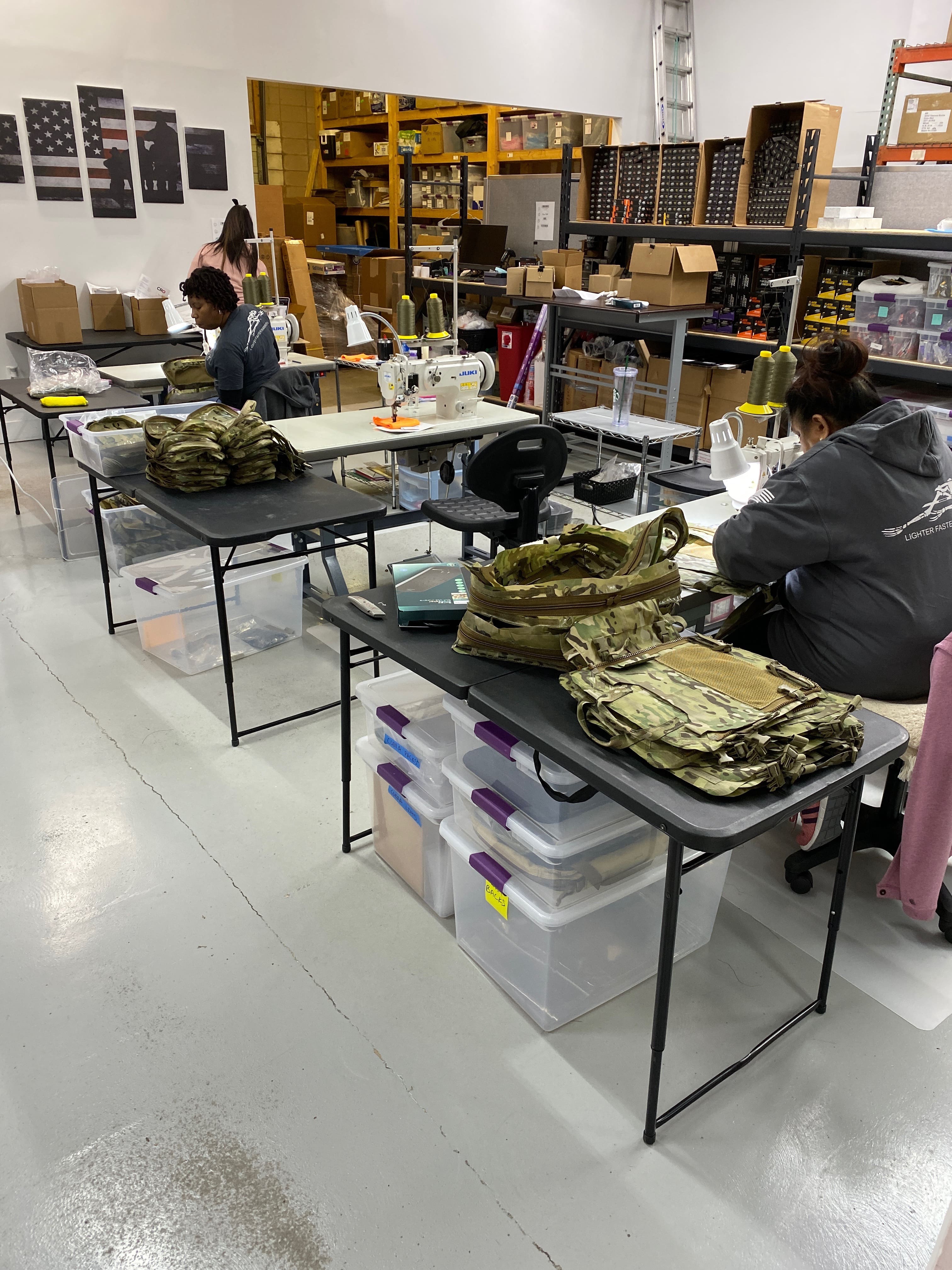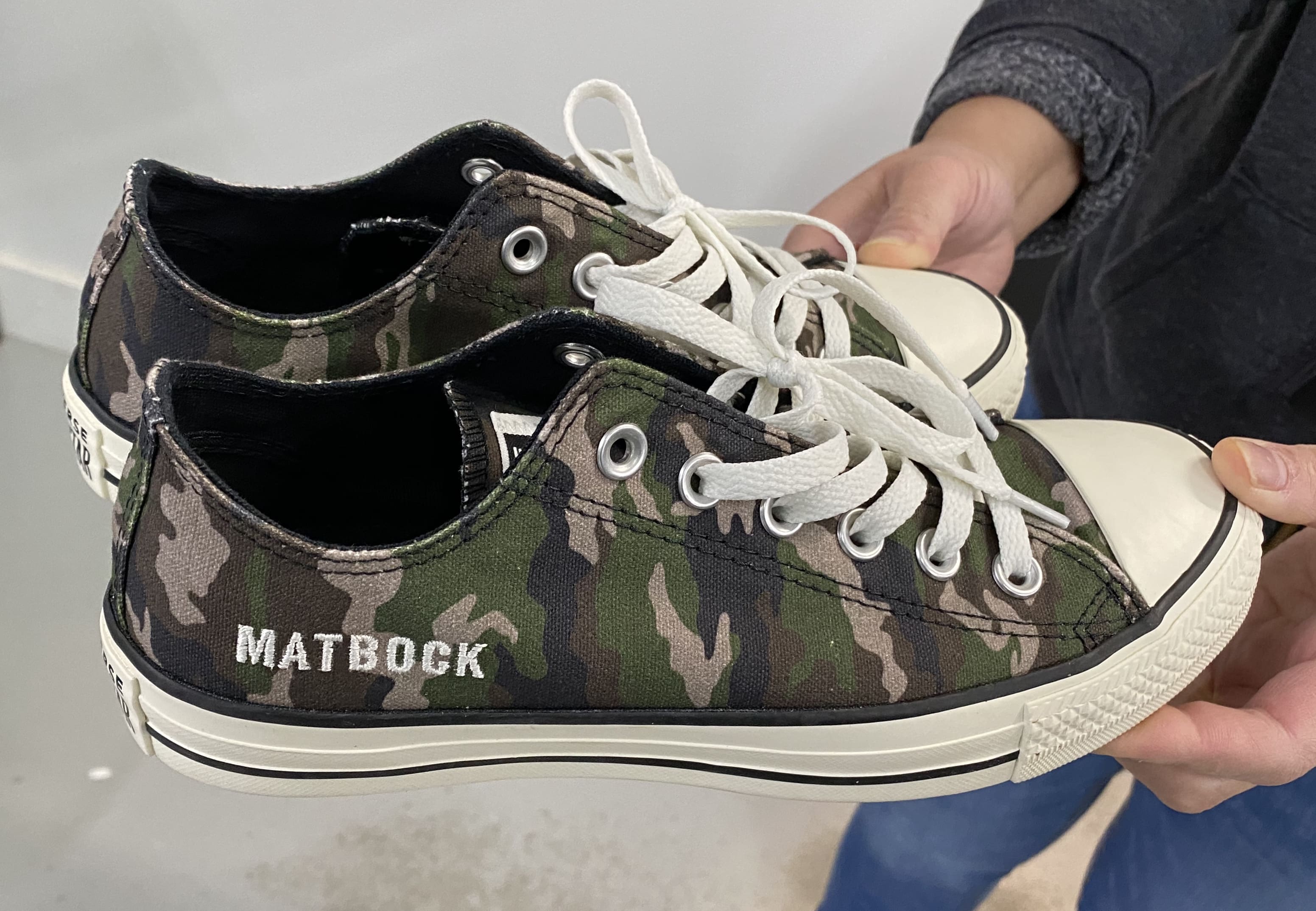Recently, we published a TacJobs posting for local business MATBOCK. A couple of people who aren’t local, nor even familiar with the US textile industry criticized MATBOCK for offering wages commensurate with the local market.

But wages alone don’t sum up a company. I stopped by last week and was amazed at how much the brand had grown with their sewing floor quadrupling in size over the past few months. In fact, they are filling up any open space with new machines.
I sat down at lunch with the crew and asked how things were going. In addition to offering benefits, the work environment is very family-like. That’s where I ran into one of the ladies wearing these shoes. And then I found out several of the sewers had ordered these custom kicks to show off their pride in the company they work for.

That’s not something you see every day.


When I first saw the sewers wearing these, I figured it was something they gave staff before I showed up. I’ve worked for some charitable companies who really gave away great logo’d uniform pieces and comfort items so it was an easy assumption. When I heard them say they bought them with their own money and chose to put the company name on them I was a bit shocked… but only for a second. Then I thought about it. These are absolutely the kind of people you would pay your own money to custom order something to represent. They are warm, caring, and generous; great people to work for and family-like is a great way to describe the work environment.
People who don’t know the industry complained about TT a few years back. It was typical people who didn’t understand the concept of getting paid per piece, taking work home (for pay), or anything else that went into it.
TT has great, caring people working there, and I’ve never heard anything negative about MATBOCK regarding quality or work place treatment from anyone who actually knows them or their products.
$13 an hour as a starting point, plus good benefits doesn’t sound all that bad to me.
It’s always great if a company can offer higher wages and better benefits, but the reality is between the conception, creation and the product making its way into the customer’s hands there’s a ton of non obvious expenses. Hell for starters companies hire more than one person. Materials, equipment, shipping, insurance, ect. cost money. And of course businesses are designed to make a profit. That’s how businesses work.
There’s only so many ways a company can make a stand about good pay and benefits while still remaining in business.
I run a small non-profit and the amount of hidden costs are staggering at times. It’s easy to tell from the comments who has and hasn’t run a business.
And it seems like the point was completely lost…
Skilled labor in the textiles industry, worldwide, makes less than similar training level jobs in other industries. So say a carpenter will (on average) make more money than a sewer and a textiles engineer will make less than a mechanical engineer (educated from the same school and same duration). Why? Don’t know, but I’ll place a bet that it’s the same reason why most traditional female jobs make less than traditional male jobs.
As SSD said in the last comment of our discussion, a lot of the textiles industry in the US is primarily because of the Berry Amendment, which makes it a Government controlled problem where the Government isn’t even willing to increase the status of the trade by accepting to pay a higher cost for products.
This doesn’t mean that employees hate their jobs or that the work environment is bad. It simply means that the pay in the textiles industry is shit, which in the long term won’t make it attractive to go into the trade.
I don’t know how I can make it more clear than that.
I’ve worked in a few cut and sew shops in a few different states, and the pay does not compare favorably to other industries. In my anecdotal experience the sort of personality that succeeds at sewing is not the sort that is good at negotiating better pay. People that sew and are aggressive and have a drive to earn more don’t ask for raises, they simply leave the industry, or work for themselves. I suspect the more structured training and certifying processes of other trades, along with collective bargaining in the form of unions for some is another part of why the pay is less.
My current workplace is offering wages lower or on par with the local fast food restaurants, and constantly complaining that they can’t find enough qualified sewers.
Only exception I know of is when I worked at Lululemon who were aware that they were “overpaying” (compared to other Canadian based companies) people so that they’d “live a happy life” or something. A position with a tactical company offered $5 CAD less than what I made as an intern there, which seemed to be a “normal” salary. No wonder they attracted so much talent from other local companies.
Currently here in Norway I’m in a position where we are simply underpaid compares to other jobs with similar education level (which is very easy to measure because we’re all Uni educated). We of course also have a problem finding talent, which isn’t weird when it’s only Arc and us who work the way we do.
I’m stepping on all the toes I can find related to me and my colleagues salaries, and I’m ok with that. I’d actually go as far as say that I’m proudly doing it.
I am not sure about your point, but berry makes everything more expensive and what makes you think just because the sew, they are woman? Not ever job can gets the same amount of money. I think SSD point was MATBOCK is a great company and people like working there. Sometime it’s hard to find a good place to work. You can get paid 25$ to wash dishes at some restaurants. Doesn’t mean everyone wants to do that.